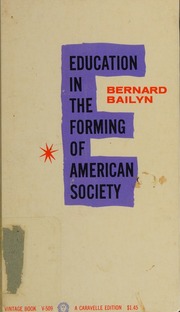
Education in the Forming of American Society
References and Quotes
Reference
An Everlasting Faith
In his important monograph Education in the Forming of American Society, Bernard Bailyn, as you’ll recall, said anyone bold enough to venture a history of American schooling would have to explain the sharp disjunction separating these local institutions as they existed from 1620 to 1890 from the massification which followed afterwards.1 In presenting his case, Bailyn had cause to compare "two notable books" on the subject which both appeared in 1900. One was Davidson’s, the other Edward Eggleston’s.
Reference
An Everlasting Faith
Most of the analysis from this section is taken directly from Education in the Forming of American Society.
Quote
Used in: De-Moralizing School Procedure
had troubled well-disposed, high-minded people. (p. 27)
Quote
Used in: An Everlasting Faith
Davidson starts with “The Rise of Intelligence” when “man first rose above the brute.” Then he trots briskly through “ancient Turanian,” Semitic, and Aryan education, picks up speed on “civic education” in Judaea, Greece, and Rome, gallops swiftly across Hellenistic, Alexandrian, Patristic, and Muslim education; leaps magnificently over the thorny barriers of scholasticism, the medieval universities, the Renaissance, Reformation, and Counter-Reformation; and then plunges wildly through the remaining five centuries in sixty-four pages flat. (p. 23)
Quote
Used in: An Everlasting Faith
My endeavor has been to present education as the last and highest form of evolution. . . . By placing education in relation to the whole process of evolution, as its highest form, I have hoped to impart to it a dignity which it could hardly otherwise receive or claim. From many points of view, the educator’s profession seems mean and profitless enough, compared with those that make more noise in the world; but when it is recognized to be the highest phase of the world-process, and the teacher to be the chief agent in that process, both it and he assume a very different aspect. (p. 23)
Quote
Used in: An Everlasting Faith
fundamentals of an everlasting faith as broad as human nature and as deep as the life of the race.” (p. 24)
Quote
Used in: An Everlasting Faith
the story had to be got straight. And so a few of the more imaginative of that energetic and able group of men concerned with mapping the over-all progress of “scientific” education, though not otherwise historians, took over the management of the historical work in education. With great virtuosity they drew up what became the patristic literature of a powerful academic ecclesia. (p. 24)
Quote
Used in: An Everlasting Faith
grew in almost total isolation from the major influences and ‘shaping minds of twentieth-century historiography; and its isolation proved to be self-intensifying: the more parochial the subject became, the less capable it was of attracting the kinds of scholars who could give it broad relevance and bring it back into the public domain. It soon displayed the exaggeration of weakness and extravagance of emphasis that are the typical results of sustained inbreeding. (p. 25)
Quote
Used in: An Everlasting Faith
The whole range of education had become an instrument of deliberate social purpose. (p. 38)